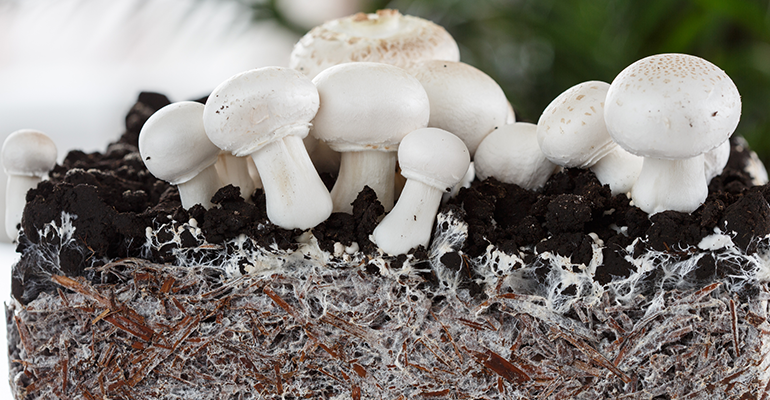News
Mycelium to move beyond plant-based applications
12 Feb 2024As mycelium development kicks off in 2024 with new multi-million investment, product development, and retail expansion, manufacturers lean into launches.
Mycelium, the material from fungi, is prominent in plant-based applications in food and drink. A pioneering ingredient for the plant-based meat industry, mycelium is known for its natural growing process, ability to mimic animal protein textures, and whole-cut product offering that has an appealing taste, without a lengthy ingredient list.

This last attribute, of featuring a short ingredient list, is “something most plant-based offerings on the market can’t claim”, Sarah-Marie Cole, chief marketing officer of MyForest Foods, told Ingredients Network.
Only at the beginning
“Mushroom remains a standout ingredient across total foods and plant-based foods,” Linette Kwon, data analyst at the Plant Based Foods Association (PBFA), told Ingredients Network.
According to the latest insights from Innova, when looking at total food product launches on a global scale, mushrooms are mainly prevalent in ready meals or dishes, sauces and seasonings, snacks, and supplements.
“We believe that we are just scratching the surface of mycelium’s potential for plant-based and hybrid meat applications,” added Cole.
In plant-based applications, mycelium is a primary ingredient for whole-cut plant-based meats – specifically, plant-based burgers, deli meats, jerky snacks, or other plant-based seafood. Emerging names are creating new product developments, using mycelium to make plant-based cheese and eggs.
“Fungi and mushrooms have always resembled meat more than plants,” said Cole. “Beef Steak Polypore, Chicken of the Woods, and Lobster Mushrooms get their name for a reason: they mimic animal protein properties.”
New mycelium releases
New-for-2024 mycelium product developments are already under way. German biotech company Infinite Roots closed a $58 million (€46 million) Series B funding round on 25 January, TechCrunch reported, making it one of the largest European investments in mycelium technology.
Following the arrival of its “meat-plus” concept in Israel, on 8 January, Mush Foods announced the launch of its 50CUT mycelium blends to food service customers in the US. In December 2023, Nature’s Fynd, a Chicago-based food tech startup, announced that it was preparing to introduce what it hailed as the “world’s first” fungi-based yoghurts. The brand launched its yoghurts in Whole Foods Market stores across the US in January.
As for the year ahead, shiitake mushrooms are anticipated to be the mycelium source to watch in the US, Kwon said. Plant-based meat, snacks, and cheese products are expected to feature the greatest number of mushrooms in new food product launches.
In addition to food launches, mushrooms are an increasingly popular ingredient in drinks, where they are marketed as improving brain health and focus. Mushroom coffee launches grew by over 90% from 2018 to 2023, Kwon said, citing Innova data. On a global scale, new beverage launches are featuring reishi, lion’s mane, and cordyceps mushrooms.
Similarly, predictions for 2024 revolve around more mushroom-containing beverage product launches.
Kwon said: “With growing interest in ‘natural’ or functional claims, we expect brands to continue emphasising the health benefits of mushrooms in their new products that include mushrooms.”
Health, novel tech applications, and shiitake variety
From 2021 to 2023, mushroom-based snacks, plant-based meat products, and plant-based cheese product debuts held strong each year, with the number of new mushroom-based snack launches peaking in 2022. Throughout these years, the most popular mushroom type used in plant-based food products was shiitake mushrooms.
“When we look at drinks and beverages globally, sports drinks, energy drinks, and baby meals continue to use mushrooms as a key ingredient,” said Kwon. The emphasis on prebiotics, immune health, brain health, and digestive and gut health are among the main health benefits of mushroom-containing product launches over the past few years.
Mycelium production typically focuses on liquid fermentation, which brews the ingredients in tanks. However, producers have explored and implemented other methods. Instead of liquid-state fermentation, mycelium producer MyForest Foods uses solid-state fermentation, growing on a substrate.
 © AdobeStock/agnormark
© AdobeStock/agnormark
MyForest Foods uses a farming technology called AirMycelium to grow mycelium from a blend of wood chips and other plant materials, resulting in its MyBacon product. Beyond its initial product launch, the brand has experimented with a few new flavour concepts.
“Although we’re focused on bringing our hero product, MyBacon, to a broader market, we are overjoyed by the potential to tap into a broader array of whole-cut meats in the coming years,” said Cole.
After completing three entrepreneurial programmes with the EIT Food Accelerator Network Programme, Bosque Foods, a biomass fermentation company, is pursuing the creation of next-generation whole-muscle meat and fish alternatives using its mycelium platform.
“With the support of the programme, we were able to expand our business, creating the next generation of meat alternatives from Mycelium, accelerating the world’s transition to environmentally sustainable, equitable, and animal-free protein,” said Isabella Iglesias-Musachio, CEO and founder of Bosque Foods.
A developing trend
A focus on individual health and the wider planet’s health is driving uptake and interest in mycelium launches.
“The consumers’ savvy behaviours lend themselves nicely to the abilities of mycelium, where taste and texture are nearly identical to animal products, but they don’t come with the moral implications and carbon footprint,” said Cole.
Future mycelium developments are anticipated to focus on “taste perfection matched with a ‘real food’ clean label”, said Cole.
She added: “We hope that mycelium foods become their category, outside of the plant-based categorisation, as awareness, education, and new food innovations increase over time.”
Related news

Oat Barista: Innovation for game-changing beverages
20 Nov 2025
Oat Barista is a clean label, sustainable, and innovative drink base specifically designed to create the perfect foam in one single ingredient.
Read more
How younger consumers are redefining ingredient choices and rejecting brand loyalty
18 Nov 2025
Gen Z and millennial consumers’ preferences for transparency, functionality, and purpose are “redefining the very nature of consumption itself”, says SPINS.
Read more
Hybrid formats and flexible positioning to disrupt category norms in 2026
17 Nov 2025
Trend forecasters expect food and drink to move more fluidly across occasions, functions, and formats as consumers seek versatility, novelty, and convenience.
Read more
Danone highlights digestive health as potential ‘tipping point’ for food industry
13 Nov 2025
Danone is betting on a food industry “tipping point” that will bloat the market for healthy products, particularly those related to gut health.
Read more
New UPF standard hoped to offer consumers ‘coherence and clarity’
10 Nov 2025
Ingredients companies are being urged to enter “a new era of partnership and innovation” following the launch of the industry’s first non-UPF verification scheme.
Read more
Faravelli at Fi Europe: Showcasing FARA® functional solutions for food and nutra
28 Oct 2025
At Fi Europe 2025 in Paris (stand 72M39), Faravelli showcases FARA® Customized Functional Solutions and a wide ingredient portfolio for food and nutra – delivering quality, innovation, and expertise.
Read more
Agrigum Redefined FIBER
27 Oct 2025
Agrigum has transformed gum acacia into a natural, science-backed fibre that supports gut health, sustainability, and innovation across global food and nutrition applications.
Read more
Expanding boundaries in food & beverage innovation
23 Oct 2025
IMCD and FrieslandCampina Professional expand partnership to deliver Kievit® across EMEA, enabling brands to enhance quality and accelerate time-to-market for tomorrow’s food & beverage creations.
Read more
Amazon Grocery launch aims to balance quality with affordability
22 Oct 2025
Global e-commerce giant Amazon has introduced a new private-label food brand, combining existing Amazon Fresh and Happy Belly products with new everyday items.
Read more
Powerade enters hydration space with launch of Power Water
21 Oct 2025
Coca-Cola’s Powerade brand has launched a zero-sugar, electrolyte-enhanced functional water, marking the brand's entry into the hydration space.
Read more